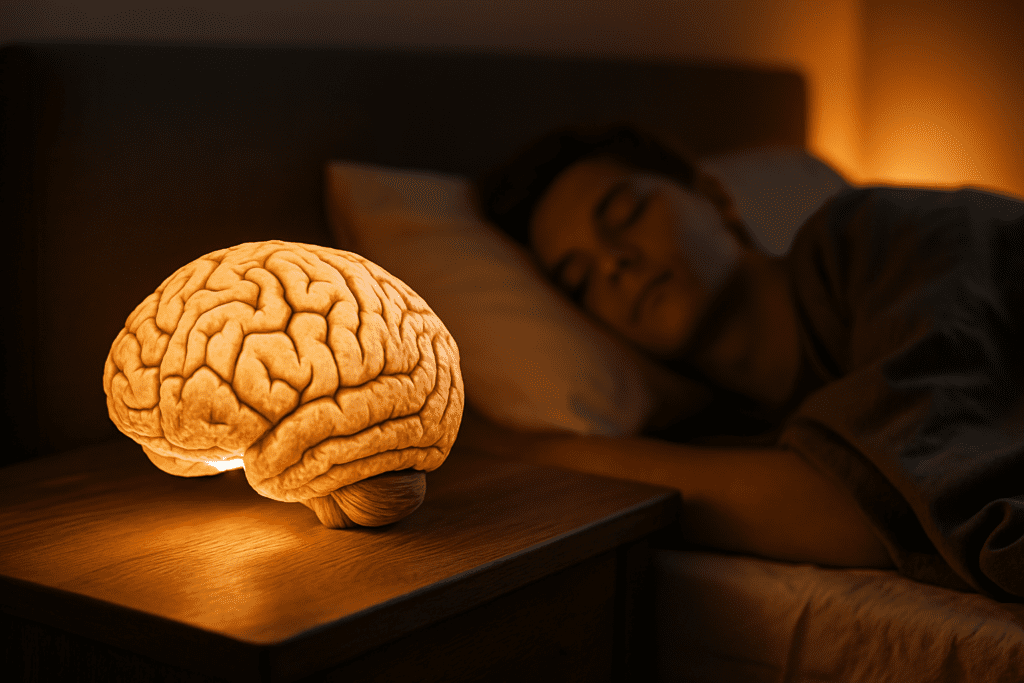Introduction
Sleep is one of the most essential yet mysterious aspects of human health. Despite being a universal biological necessity, many people still wonder, why does sleep feel so good? The comfort of drifting off into slumber, the feeling of refreshment upon waking, and the profound healing that happens overnight all point to the extraordinary power of sleep. In the world of biohacking and human optimization, sleep is increasingly recognized not just as rest, but as a highly active, regenerative process crucial to peak mental, emotional, and physical performance. But what exactly happens when you sleep? How does it impact your brain, your body, and your overall wellbeing?
You may also like: How to Sleep Better at Night Naturally: Science-Backed Biohacks to Increase Deep Sleep and Prevent Insomnia Faster
This article dives deep into the science behind sleep’s irresistible allure, unraveling what really occurs while you are sleep. We’ll explore why do we sleep, the functions of sleep, and what happens to your brain when you sleep, integrating cutting-edge research and insights from neuroscience, physiology, and psychology. We’ll also answer deeper questions, like why do we need sleep scientifically, when you sleep does your body heal, and how does sleeping help one relax. By understanding these intricacies, you’ll be equipped to appreciate how important is sleep and how to optimize it for better brain function, emotional resilience, and long-term health.
Why Does Sleep Feel So Good?
The sensation of drifting into sleep is almost universally pleasurable. From the easing of tension to the warmth of a cozy bed, sleep provides both physical and emotional relief. But the real reason why sleep feels so good is rooted in neurobiology. When we fall asleep, our brains reduce their exposure to stress hormones like cortisol while increasing the production of melatonin and GABA, both of which have calming, soothing effects on the nervous system. Additionally, during deep sleep phases, especially slow-wave sleep (SWS), the body releases growth hormone, facilitating tissue repair and restoration, which contributes to the post-sleep feeling of rejuvenation.
Moreover, the parasympathetic nervous system takes over during sleep, slowing heart rate, lowering blood pressure, and relaxing muscles. This “rest-and-digest” mode supports cellular repair and detoxification. Neurologically, sleep also allows for mental clarity by rebalancing neurotransmitters, which plays a major role in why people report feeling refreshed and emotionally stable after quality sleep. The psychological comfort, coupled with physiological renewal, explains why does sleep feel so good at both the conscious and subconscious levels.
Why Do We Sleep?
Sleep has long fascinated scientists and philosophers alike. While once considered a passive state, we now know that sleep is a highly active biological process vital for brain function, metabolism, immune defense, and emotional regulation. So, why do we sleep? The most accepted theories include the restorative theory, energy conservation, memory consolidation, and brain plasticity.
The restorative theory posits that sleep is necessary for the body to repair tissue, detoxify the brain, and replenish neurotransmitters. Meanwhile, the energy conservation theory explains sleep as a means of preserving calories and reducing metabolic demands during periods of inactivity. Perhaps most fascinating is the role of sleep in neuroplasticity—our brain’s ability to reorganize itself—which is essential for learning, creativity, and emotional adaptation. Without sleep, these processes degrade rapidly, leading to cognitive dysfunction and mood disturbances. Ultimately, why do we sleep lies in its multifaceted support of both mind and body health.

What Happens When You Sleep?
To understand what happens when you sleep, it’s important to break down the stages of sleep. There are two primary types: Non-Rapid Eye Movement (NREM) sleep and Rapid Eye Movement (REM) sleep. Each plays a unique role in physical restoration and cognitive processing.
During NREM sleep, especially in deep stages, the body repairs muscles, strengthens the immune system, and clears out metabolic waste from the brain through the glymphatic system. REM sleep, on the other hand, is when most dreaming occurs and emotional memories are processed. Here, brain activity while sleeping resembles that of wakefulness, yet the body is temporarily paralyzed—a phenomenon that ensures dream safety and psychological equilibrium.
Electroencephalogram (EEG) scans show distinct brain activity during sleep, revealing how the brain cycles through various frequencies that facilitate memory storage, learning, and emotional integration. This is why sleep is integral not just for rest but also for high-level cognitive function and long-term brain health.
What Happens to Your Brain When You Sleep?
What happens to your brain when you sleep is one of the most intriguing aspects of sleep science. Contrary to the outdated belief that the brain shuts down during sleep, modern neuroscience confirms that the brain remains highly active, performing vital functions.
The hippocampus and neocortex engage in a synchronized conversation to consolidate short-term memories into long-term storage. Meanwhile, the prefrontal cortex—the center of decision-making and self-control—recharges, leading to better judgment and reduced impulsivity upon waking. Simultaneously, the brain flushes out neurotoxic waste, including beta-amyloid, which is implicated in Alzheimer’s disease. This cleaning process underscores what does sleep do for the brain, especially in preserving cognitive health over time.
Perhaps most importantly, the brain’s emotional centers are recalibrated during REM sleep, allowing individuals to wake up with improved mood and emotional regulation. Thus, what happens to your brain when you sleep is not rest—it’s refinement, detox, and emotional resilience in action.
The Functions of Sleep: More Than Just Rest
To list the three purposes of sleeping, most scientists agree on restoration, memory processing, and energy conservation. Yet these only scratch the surface of why do we need sleep.
First, from a biological standpoint, sleep heals the body. It facilitates muscle repair, hormone regulation, and immune function. Second, from a neurological perspective, sleep enhances synaptic pruning—a process that removes redundant neural connections, optimizing brain efficiency. Third, on a psychological level, sleep helps in mood stabilization by regulating neurotransmitters like serotonin and dopamine.
These functions of sleep make it a cornerstone of human optimization. Beyond merely recharging the body, sleep elevates mental performance, stabilizes emotions, and enhances learning, making it a powerful biohack for productivity and wellbeing.
Why Do We Need Sleep Scientifically?
When asking why do we need sleep scientifically, we turn to empirical evidence from neuroscience, endocrinology, and behavioral psychology. Sleep deprivation studies consistently show impairments in memory, attention, and emotional regulation. Chronic poor sleep is linked with a higher risk of obesity, type 2 diabetes, cardiovascular disease, and depression.
Scientifically, sleep is required for synaptic homeostasis—the balance between strengthening and weakening neural connections. This balance is essential for learning and mental flexibility. In the immune system, cytokines—proteins that fight infection—are released during sleep, proving why is sleep so important for resilience against illness.
From a hormonal standpoint, sleep regulates leptin and ghrelin—hormones that control hunger. Disruption in these hormones due to poor sleep contributes to overeating and metabolic dysfunction. Scientifically, why do we need sleep extends beyond rest into essential maintenance of nearly every system in the body.
What Does the Brain Do During Sleep?
A common myth is that you are completely inactive while you are sleep. But in truth, the brain engages in one of its most productive cycles. So, what does the brain do during sleep? It consolidates memory, regulates mood, removes toxins, and enhances neural connectivity.
During sleep, especially REM and Stage 3 NREM sleep, the brain remains active during sleep in patterns that help integrate emotional experiences and resolve cognitive dissonance. The amygdala, responsible for fear and emotional reactions, becomes active during dreams, helping you work through trauma or emotional distress.
Sleep also plays a critical role in neurogenesis—the formation of new neurons in the hippocampus. This adds to brain function while sleeping, showing that even rest is a time of brain renewal and growth.
Brain Activity While Sleeping: Mapping the Nighttime Mind
Using advanced neuroimaging, scientists can now observe brain activity while sleeping in real time. These studies reveal that brain activity during sleep varies by stage but remains surprisingly dynamic. During Stage 1 and 2 NREM sleep, the brain starts to disconnect from sensory input, preparing for deeper stages. In Stage 3, delta waves dominate, representing the most restorative period of sleep.
Then comes REM sleep, where brain activity when sleeping mirrors wakefulness. In this stage, the brain replays memories, processes emotions, and activates the visual cortex for dream imagery. Despite this intense activity, the brain suppresses motor function to prevent physical responses—a mechanism essential for sleep safety and brain-body coherence.
During REM sleep, brain activity is also key to creativity and insight, which is why many great thinkers and artists have reported receiving creative breakthroughs during dreams. Thus, what does your brain do while you sleep isn’t passive at all—it’s innovating, healing, and evolving.
When You Sleep Does Your Body Heal?
One of the most beneficial outcomes of deep sleep is that sleep heals the body. The pituitary gland releases growth hormone during NREM sleep, which helps rebuild muscle tissue, repair cells, and support immune function. For athletes, sleep is just as important as training and nutrition.
So, when you sleep does your body heal? Absolutely. Wounds repair faster, inflammation decreases, and cellular regeneration accelerates. Hormonal regulation during sleep also contributes to reproductive health, weight management, and skin integrity.
Moreover, sleep is a detoxifier. The lymphatic system in the body and the glymphatic system in the brain work most effectively during sleep to clear out metabolic waste. Therefore, consistent, quality sleep is not a luxury—it’s the body’s most powerful, natural healing mechanism.

Why Do We Move When We Sleep?
Many people wonder why do we move when we sleep, even if unaware of it. Movement during sleep can be physiological, such as shifting positions for blood flow, or neurological, such as during REM sleep behavior disorder or sleepwalking. Most movement, however, occurs during lighter stages of sleep when brain activity partially resumes sensory processing.
Sleep spindles and K-complexes—unique EEG patterns in Stage 2 sleep—can be associated with small bodily adjustments. These ensure that joints don’t stiffen and circulation remains optimal. In some cases, movement during sleep reflects dream content, especially when REM sleep paralysis is incomplete.
Overall, movement is not only normal but sometimes beneficial. It reflects the body’s effort to stay safe, comfortable, and responsive even in unconscious states. Therefore, why do we move when we sleep has answers in both anatomy and neural circuitry.
Frequently Asked Questions
1. What is happening in the brain during REM sleep?
During REM sleep, the brain shows high-frequency activity similar to being awake. Emotional regulation areas like the amygdala are highly active, while the prefrontal cortex remains less so, allowing for vivid dreaming. This stage is crucial for memory consolidation, creative problem-solving, and emotional processing. REM sleep also plays a role in neuroplasticity, the brain’s ability to adapt and grow. During REM sleep, brain activity becomes essential for long-term cognitive and emotional health.
2. Does sleep help detoxify the brain?
Yes, sleep is when the brain undergoes its most robust detoxification process. The glymphatic system activates during deep NREM sleep to flush out toxins, including amyloid-beta, which is linked to Alzheimer’s disease. This cleanup process is one of the many functions of sleep and explains what happens to your brain when you sleep. Consistently good sleep helps maintain cognitive clarity and delay neurodegenerative processes.
3. Can lack of sleep affect emotional stability?
Absolutely. Sleep deprivation impairs the amygdala-prefrontal cortex connection, leading to emotional reactivity, irritability, and poor stress tolerance. REM sleep in particular helps process emotions and traumatic memories. This is a major reason why sleep feels so good emotionally and why people feel more balanced after deep rest. Chronic sleep loss can lead to mood disorders like anxiety and depression.
4. Why is deep sleep more restorative than light sleep?
Deep sleep, especially Stage 3 NREM, is when the body releases the most growth hormone, enabling physical repair and immune regulation. EEG shows slow delta waves during this stage, reflecting synchronized brain function and lowered metabolic demands. This deep phase supports brain function during sleep and physical recovery, underscoring why do we need sleep scientifically. Light sleep, though useful for transition, lacks these benefits.
5. Are you dead when you sleep?
No, although sleep may appear like unconsciousness, the brain and body remain highly active. The phrase are you dead when you sleep is metaphorical at best. Your brain processes memories, your heart continues to beat, and essential systems remain functional. In fact, sleep is a time of incredible biological activity, not cessation.
6. What are the three primary purposes of sleep?
Most experts agree that sleep serves restoration, memory consolidation, and energy conservation. These three purposes of sleeping align with physical healing, cognitive performance, and metabolic efficiency. Understanding these roles deepens our appreciation of why is sleep so important for holistic health.
7. How does sleeping help one relax physically and mentally?
Sleep activates the parasympathetic nervous system, reducing cortisol and promoting relaxation. It restores neurotransmitters like serotonin and dopamine, contributing to a calm, content state. This biochemical balance is why sleep feels so good and how sleeping helps one relax. Mental stress dissipates as the brain processes experiences and emotions during sleep.
8. What happens to the immune system when we sleep?
While sleeping, the immune system becomes more efficient. Cytokine production increases, and inflammation is regulated. This helps the body fight infections and heal faster. It’s also part of why do we sleep—to strengthen the body’s defense mechanisms. Poor sleep weakens immunity and increases susceptibility to illness.
9. How do brain waves change during sleep?
Brain wave activity transitions from alpha and beta in wakefulness to theta and delta in deeper sleep. These changes reflect the brain’s movement from light rest to deep restoration. Brain activity while sleeping follows this predictable pattern and correlates with healing and memory processing. Monitoring these patterns has become a diagnostic tool in sleep medicine.
10. Can sleep affect how you age?
Yes, poor sleep accelerates biological aging by impairing cellular repair, reducing melatonin (an antioxidant), and increasing cortisol. Chronic sleep loss is linked with shortened telomeres—biomarkers of aging. Therefore, quality sleep is essential not only for energy and focus but also for longevity and healthspan.

Conclusion
Sleep is not just a break from waking life—it’s a profound biological state that renews the mind, repairs the body, and restores emotional balance. Understanding what happens when you sleep reveals a symphony of neural and physiological processes that defend your health, enhance cognition, and promote healing. From what does the brain do during sleep to why does sleep feel so good, every phase of rest serves a vital purpose in human optimization.
By exploring the science of brain function during sleep, why do we need sleep scientifically, and how important is sleep for holistic wellbeing, we unlock the potential to not only sleep better but to live better. Whether you’re biohacking your routine or simply aiming for better rest, recognizing that sleep heals the body and the brain remains active during sleep empowers you to prioritize this essential cornerstone of wellness.
brain detoxification during sleep, neuroplasticity and sleep, sleep cycle science, circadian rhythm regulation, deep sleep and recovery, cognitive restoration during sleep, healing benefits of rest, sleep optimization strategies, how dreams affect memory, emotional healing through sleep, nighttime brain function, sleep and immune defense, REM sleep and creativity, parasympathetic activity during sleep, glymphatic system and sleep, sleep neuroscience, sleep stages explained, restorative sleep mechanisms, healthy brain aging and sleep, biohacking sleep for longevity
Further Reading:
Top 15 Proven Tips to Sleep Better at Night
8 secrets to a good night’s sleep
Biohacking Sleep: How to Improve Sleep Quality in 10 Steps
Disclaimer
The content provided by HealthXWire is for informational purposes only and should not be construed as medical advice, diagnosis, or treatment. While we strive for accuracy, the information presented on this site may not reflect the most current research or medical guidelines. Always seek the advice of your physician or other qualified health provider with any questions you may have regarding a medical condition. HealthXWire does not endorse, recommend, or guarantee the efficacy of any products, services, or treatments mentioned on this site. Users should not disregard professional medical advice or delay seeking it because of something they have read on HealthXWire. HealthXWire is not liable for any damages, loss, or injury arising from reliance on the information provided herein.



